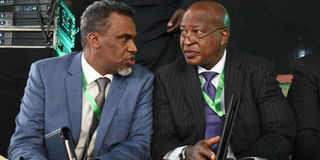We can easily ratchet up the war on graft

DPP Noordin Haji and Attorney-General Paul Kihara Kariuki during the 2019 National Anti-Corruption Conference by the Multisectoral Initiative Against Corruption at the Bomas of Kenya in Nairobi, January 24, 2019. PHOTO | DIANA NGILA | NATION MEDIA GROUP
What you need to know:
Corruption causes massive degradation of living standards as well as lopping off over two percent economic growth a year.
If you add up the collateral damage over the years, the results is a stunted country that is a shadow of what it should be.
We should use tactics such as turning some of the accused into state witnesses and making corruption expensive in terms of prison time and asset seizure.
The war against corruption needs to be re-evaluated, built up and fought on several fronts. Enough has taken place to see some serious stabs at it. But there is a formidable wall of silent resistance by the many players and beneficiaries of the status quo amid criticism that it is a start-stop scatter gun approach with little or no overall co-ordination or direction.
Corruption is the biggest and most nefarious malady that Kenya faces. It causes massive degradation of living standards as well as lopping off over two percent economic growth a year. If you add up the collateral damage over the years, the results is a stunted country that is a shadow of what it should be.
OFT-INORDINATE
As seen from the recent anti-corruption conference, there is massive support for the graft war and a growing realisation that there must be greater multi-sectoral and multi-pronged co-operation against it. But the acid test is to translate that into action, which must be thoroughly dovetailed and co-ordinated so that all parties are at one: Investigators, informers, prosecution and courts.
The spat between the DPP and DCI and the Judiciary need to be overcome. The two accuse the Judiciary of being too lenient with the accused by giving them low bail and dismissing cases over “lack of evidence”. The latter say the former must be more thorough.
Both arguments are valid. The investigating and prosecuting personnel must collect adequate evidence and methodically collate it so that cases have sufficient and convincing information. And that should be a result of comprehensive investigations rather than ad hoc ones arising from some leakage.
Yes, there is a strong argument to hone in on certain areas and carry out thorough investigations and forensic audits, but within a framework. The Judiciary must increase the number of judges and magistrates to reduce the oft-inordinate delays but also go through training and vetting.
President Uhuru Kenyatta must ensure all officials abide by a strict code of conduct. This should be enforced by independent monitoring and investigations and backed up by such tools as comprehensive lifestyle audits on officials and their families and relatives.
WHEELBARROWS
The war on corruption must become an offensive exercise and not a reactive one. The tracking of all the subjects’ accounts and those of kith and kin is one way. This may appear to be a lot of work but, under the new international banking regime, account holders’ details are accessible via central banks and other banking authorities.
Another route is to check the sources of unusually high purchases or expenditure. For example, owning and running a helicopter or private aeroplane requires a lot of money. Do an inventory of such items and examine how the owners afford to buy and maintain them.
The President has repeated directives that all public procurement must be subjected to tendering, complete with watertight quality specifications, yet we see cases of overpriced wheelbarrows. There are modalities to enforce such procedures and punish flouters.
Also, use tactics such as turning some of the accused into state witnesses and making corruption expensive in terms of prison time and asset seizure.
The lynchpin to all that is to build capacity and facilitate the purge. That requires money and skills but it’s much more cheaper than the effects of corruption.
Mr Shaw is an economic and public policy analyst. [email protected]





